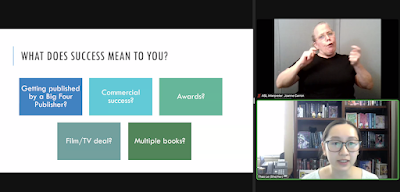Rosemary Stimola is a former independent children's bookseller, who founded the Stimola Literary Studio in 1997, a boutique agency representing fiction and nonfiction from preschool through young adult, as well as all genres. Stimola Literary Studio is made up of a wonderful team of agents.
On the wall of Rosemary's office, hangs a framed print of Maya Angelou's poem I Love the Look of Words. In the poem there is a stanza that says:
When I have stopped reading,
ideas from the words stay stuck
in my mind, like the sweet
smell of butter perfuming my
fingers long after the popcorn
is finished.
I love the book and the look of words
the weight of ideas that pop into
my mind
I love the track
of new thinking in my mind.
This is a mantra for Rosemary. When Rosemary considers a submission, the very first thing that strikes her are the words and the narrative voice that carries them.
She's attracted to complex characters, even for the youngest readers that exhibit heart as well as well as a penchant for subversive and independent thinking, challenging the status quo, and traversing boundaries.
Also, who doesn't love a page turner?
Rosemary shares authors and illustrators she represents that brought words that stuck in her mind, characters that stood up when the world asked them to, and stories that begged to be read until the last page.
All were written by authors that were not so in love with their words that they weren't willing to revise them. And, all sit well in the current marketplace, that seeks diversity, does not condescend to young readers, and challenges them to see beyond themselves.
Rosemary shared some examples.
INSIDE OUT AND BACK AGAIN by Thanhha Lai is a middle grade novel in verse that came to Rosemary as cold submission with a beautifully written query. After reading it, Rosemary was still thinking about it three days later (the words stuck), but she thought she could already write the rejection letters for it. (Historical. Vietnamese protagonist-this was 2009. Told in verse.) This book sold for a very modest advance but went on to win the National Book Award, a Newbery Honor, and still lives on NYT Bestseller list.
ONE OF US IS LYING by Karen M McManus came to Rosemary at the right time, in the right place (with what was happening with young people in the world). It came with a perfectly crafted query. Ro couldn't put it down. This book has spent 100 weeks on the bestseller list and sold in 41 languages. Karen has earned the title of Queen of the YA Mystery Thriller.
Mathew Cordell has been with Rosemary for more books and years than she can remember.
WOLF IN THE SNOW won the Caldecott Medal. It was his 31st book! There are no words in the books, so you might wonder: Where are the words that stuck in Rosemary's mind? They were there, in the art.
Some books recently published.
James Bird, author of THE BRAVE, had Rosemary at his character's first word, which happened to be a number. 18. This main character has unique condition that leads him to count every word spoken to him. It makes him a target for bullies and a source of frustration for his dad.
THE FELL OF DARK by Caleb Roehrig (Caleb's fourth YA novel) was just published days ago. Caleb's was a cold submission. He caught Rosemary's attention with a sharp and witty query letter. He also had a compelling mystery and complex LGBTQ characters, in what became his debut novel LAST SCENE LEAVING.
And a forthcoming title by Irene Latham and Charles Waters. Poets and authors. They write independently, but when combined they form the dynamic duo referred to as the The I&C Construction Company. Together they have penned CAN I TOUCH YOUR HAIR and DICTIONARY FOR A BETTER WORLD. Their latest brings something very special into our market, looking deeper into stories that have not been told. AFRICAN TOWN, a historical novel, told in verse through multiple voices, tells the story of the last African's brought to America. It comes out spring of 2022. Rosemary says, "It's told in voices that sing and ache. Even the ship has been given a voice that speaks of her human cargo and their fates."
These books "go beyond the moment and bring words and pictures together that stick in minds, just like they did in mine."

































